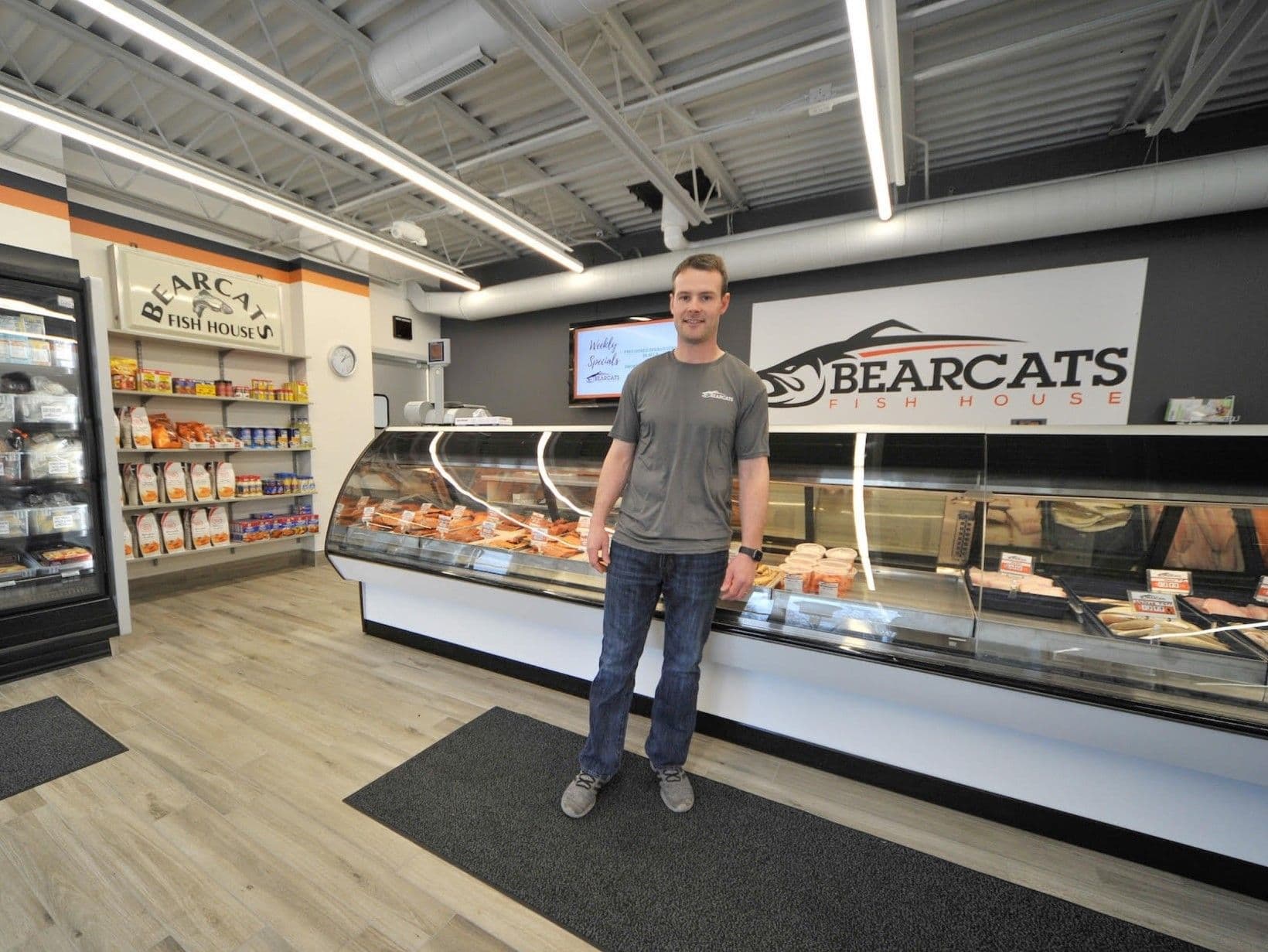Located near the mouth of Duck Creek in Green Bay, Wisconsin, Bearcat’s Fish House has been smoking fish for decades. We chose Bearcat’s because of their dedication to quality and, like us, they bridge Alaska fishing communities to the Midwest.
Owner Billy Smith bought Bearcat’s in 2012 because of his experience in commercial fishing. “I grew up on the Kenai Peninsula in Alaska,” Billy says. “My father was a commercial fisherman, and he still runs a fishing operation out of Kenai.” Born and raised in Sterling, Alaska, on the bountiful Cook Inlet, the Smiths made a life from the sea. “We caught clams and also salmon, sockeyes predominantly, but we would also get some cohos, pinks, and kings.”

When he wasn’t at school or fishing, Billy spent his time playing hockey. During high school, Billy’s talent on the ice earned him the opportunity to play for the Green Bay Gamblers, a junior hockey team. “I met my wife while I was playing junior hockey, and then we got married after college and had a family, so that’s how I ended up in this area.” Billy has been anchored to the Midwest ever since.
Billy reached out to the owners of Bearcat’s Fish House at the right time. “I was actually going back up to Alaska to commercial fish,” Billy says. Just as he was looking to get into business for himself, Bearcat’s, he says, “fell into place.” Then owners Jerry “Bearcat” Berkovitz and his wife Linda were eager to retire and hand the business off to someone as passionate about smoked fish as they were. “They had such a wonderful business established that we tried our best to keep the quality and the products the same,” Billy says. Ten years later, Billy’s business carries on Bearcat’s tradition as a premier source of smoked seafood in the Great Lakes region.

If you get smoked fish in your subscription or a one-time box, it’s gone through Bearcat’s meticulous smoking method. “It’s a lengthy process,” Billy explains. Bearcat’s uses 4,700 square feet of operating space, freezers, coolers, and smokers that can preserve fish with either a cold or hot method. For Billy, all those details come down to four variables: time, temperature, moisture, and salinity.
Billy studied business in college, but he has the attention to detail of a laboratory scientist. “Preservation has a lot of variables, but it’s basically a drying process,” Billy says. “You’re taking moisture out of the fish, you add salt through a brine, and then you have an additional layer of protection with smoke.”
“It’s awesome to handle fish that I grew up harvesting and see it through to the end consumer.”
Today, we enjoy the rich, savory flavor of smoked fish, but for most of human history, smoking allowed human settlements to protect a harvest for months into the future. “Certainly, in Alaska, there is a need to hold fish for very long periods of time, to dry the product out and then preserve it with the salt and smoke.” This technique prevents the growth of dangerous microorganisms that spoil food and create foodborne illness.
Billy has learned much from traditional methods in his quest to bring high precision to an ancient art. “In our current facility, we use modern technology that allows us to control the amount of dry time, the fan speed, and the consistency of the product overall.” Billy says his method creates only a 3% variance in consistency in every batch of smoked fish. That kind of control is critical to achieve modern standards for food safety.
As you might imagine, running a smoke house has also made Billy a connoisseur of wood, and there are many traditions. For instance, Alaskans traditionally use alderwood, while more adventurous folks experiment with chips from whiskey barrels. Billy keeps it simple. “Whenever you’re smoking fish, you want to go with a little bit sweeter wood because it just has a subtle flavor that it adds to the fish.” Maple is a great choice in the Midwest. Apple, peach, or other fruitwoods are excellent options for smoking fish.
When he isn’t at home with his family, Billy spends his free time hunting and, of course, fishing in the Great Lakes. He loves the Midwest, but always looks forward to trips home to Alaska. “There is just something unique about the ocean, the tides, the clarity of the water, and the availability of all of the wildlife that we simply don’t have access to here [in the Midwest] being surrounded by freshwater.” Billy is keen to maintain his connection to his home. “Growing up in Alaska is definitely something that I really cherished, and I certainly look forward to spending more time there in the future.”

Billy is grateful for all the support from the community and partners like Sitka Seafood Market. “It’s been wonderful working with your company,” Billy says. “It’s awesome to handle fish that I grew up harvesting and see it through to the end consumer.”
Billy Smith’s attention to detail and his desire to listen and build relationships in his community are why we are proud to send our wild-caught seafood to Bearcat’s Fish House for all our smoking needs. If you are ever in Green Bay, drop in and try some local favorites like smoked whitefish from Lake Michigan with a side of cheese curds.



